Spotlight on…our Project Managers
The National Robotarium Project Management are responsible for leading and managing the centre’s varied portfolio of industry partner projects.
As a team, led by Chief Operating Officer Steve Maclaren, they are first point-of-contact for dozens of robotics projects working across a wide range of sectors including offshore renewables, agriculture, pharmaceuticals, healthcare, utilities and retail. They work closely with the National Robotarium’s engineering, operations and business developments teams and external customers.
Find out more about the team in our latest ‘spotlight on…’ feature.
Rowanne Miller
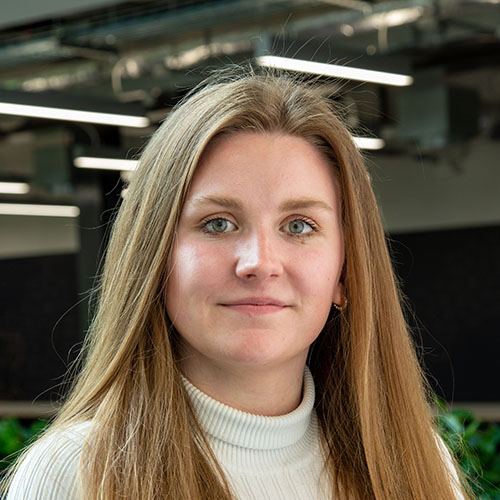
What is your background and areas of expertise?
I graduated from The University of Glasgow in 2020 with an MA in Business and Management and completed my dissertation on the impact of emotional intelligence on project management leadership styles. Since then, I have worked my way up through project management roles, starting as a project controller managing the finances and timelines of projects, before completing my APM PMQ and Advanced Agile Practitionership, and moving into a Project Manager role. Throughout the various sectors I’ve worked in, there’s always been an element of emerging technology and engineering, which was incredibly useful when joining the National Robotarium in 2022.
What attracted you to working at the National Robotarium?
The culture! The National Robotarium is a place where everyone is encouraged to share ideas, collaborate effectively, and work with empowerment and autonomy. Having worked under more traditional leadership styles, I was excited to work where my views were valued and heard, and where I had the ability to share my knowledge and learn from others. Spending every day with robots was also a bit of a bonus!
Describe a typical day as a Project Manager at the National Robotarium
There really isn’t a typical day as a PM – one day I could be hosting a full-day technical workshop with a new client or completing a financial review of a project, the next I could be helping to move a giant robot tentacle! If I had to summarise a day, it would be a lot of collaboration with every team at the National Robotarium to make sure every aspect of a project runs smoothly.
What do you enjoy most about your role?
The people – everyone at the National Robotarium is incredible to work with and I have learned so much over the past two years. Everyone is supportive of your goals, works together to deliver high-quality projects, and believes in the benefits of robotics for society – and we have a laugh every now and then!
What skills and attributes make a great Project Manager?
You have to be a great communicator, but an even better listener. A lot of a PM’s role at the National Robotarium is about communicating engineering concepts and problems with customers who might have no prior knowledge of robotics. To do this, you have to be able to listen and learn from our engineering team, learn from feedback, and truly understand the business needs of our customers. A good PM is constantly learning and adapting.
David Morrison
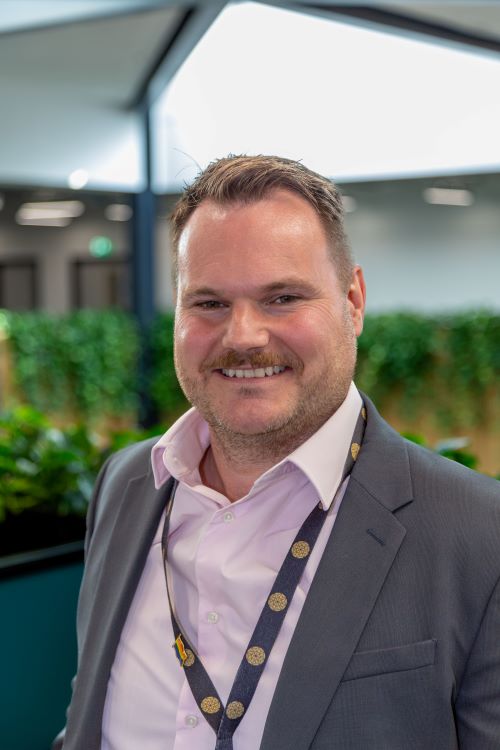
What is your background and areas of expertise?
I have a degree in Mechanical Engineering from Heriot-Watt University and worked in the offshore energy sector for a decade, initially as a design engineer progressing to manufacturing support, project engineer, and then client engineering representative on offshore inspection maintenance and repair campaigns. In 2016 I retrained through CodeClan which enabled me to work as a QA Engineer, Developer then Agile Project Manager on mobile and web app projects in the finance and agritech sectors.
What attracted you to working at the National Robotarium?
I mean who doesn’t want to build cool robots?! I grew up with Lego, Star Wars, Transformers, Iron Man and all the 80s Sci-Fi films. This directly influenced my decision to become an engineer; I wanted to build the machines of the future.
Working in the offshore sector gave me access to ROVs (submersible robots), remote control and sensing projects. The tech sector gave me exposure to analytics, user experience design and AI so when I saw the job at the National Robotarium it immediately felt like I could bring all my experiences together in this one role. The opportunity to work at the bleeding edge of technology, applying robotics research to solve societal and industry problems is just too exciting!
Describe a typical day as a Project Manager at the National Robotarium
It’s cliché to say but no day is typical because we have such a wide variety of projects, events and engagements going on and as PMs, we span it all. Currently, my day is mostly dedicated to a large research programme I am managing, which has team of around 26, encompassing industry partners, academics and subcontractors. I’m the point-person for any issues and development which can range from contracts, finances, resources, equipment, safety and logistics. The team is distributed between the four sites, one of which is overseas so ensuring good team cohesion, managing expectations and maintaining constant communications are probably my most important tasks. In addition to the four projects in that programme, I also have two smaller unrelated projects to manage, one in the fisheries sector and one in logistics. Outside of managing projects I regularly contribute to project proposals with the Business Development Team and Engineers, host and participate in internal and external industry workshops, attend site visits, and host tours with potential collaborators. I also regularly organise social events for the team, such as Fringe days, pub quiz or team hikes. It’s busy but really fun!
What do you enjoy most about your role?
It’s hard to pick one thing; I work with some great people, many of whom and leaders in their field of expertise which is very cool, but we also get to engage with robot enthusiasts young and old because tech is for everyone, and that’s fun. All the projects are about trying to make life a little better for someone either doing a job no-one does because of labour shortages, or no-one wants to do it because it is dull, dirty or dangerous so the role is socially rewarding for me. But most of all, have you seen the cool robots we use daily in our workshops?! That has got to be the best part.
What skills and attributes make a great Project Manager?
A great PM must be adaptable -one minute you will be talking contract law, and the next it could be technical detail on control systems so being able to context-switch.
Networking is the partner skill to context-switching because whilst you’ll need to know a little about a lot, you also need to know the experts you can lean on.
The PM is a “fixer” role. You deal with problems head-on and wrestle with different people, systems, organisations, and legal frameworks to get your project over the line.
I think a large part of being a PM is understanding people. Everyone works differently and has different personality traits, strengths and weaknesses. The core of my job is to deliver projects and I can only do that if everyone in my team is empowered to make and take decisions. It’s also important to adapt the communication style across the team to suit everyone so you get the best out of everyone.
As a PM you need to be able to be calm in the face of adversity. It’s important to use the skills and knowledge of everyone around you, even outside your team and above you to find solutions.
Lastly, I think it is important to be trustworthy and accountable, to everyone involved on the project and its stakeholders.
Ruth Plant
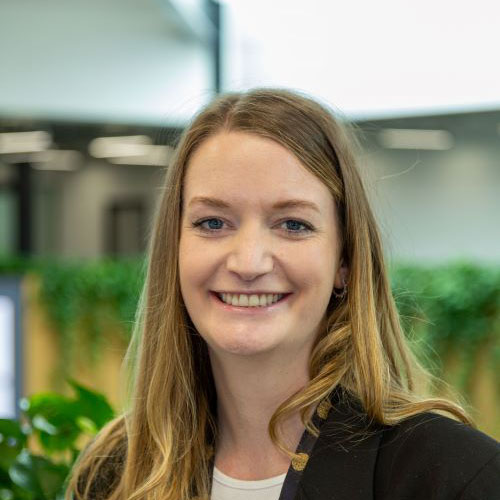
What is your background and areas of expertise?
I have been working in the higher education sector since 2015. In my previous role in Business Development, I was responsible for identifying, developing, and securing commercial opportunities, supporting strategic projects, and building long-term, valuable relationships with stakeholders. Before that, I worked as a Business and Memberships Manager, where I led business activities and membership sales, developed and trained the operational team, and lead key projects.
What attracted you to working at the National Robotarium?
I was attracted to working at the National Robotarium because of its cutting-edge research and innovation in the fast-developing world of robotics and artificial intelligence. The role sounded incredibly exciting and dynamic, offering the opportunity to collaborate with leading experts and help drive impactful projects forward.
Describe a typical day as a Project Manager at the National Robotarium
I would say there is no ‘typical day’, each day is varied and diverse, depending on the current projects and their phases. Tasks include project team check-in meetings/project stand-ups, responding to emails, hosting stakeholder meetings, creating and reviewing project work plans and other project documentation, procuring project resources, and updating project workboards and tasks to ensure projects run on time, within budget, and to the required quality standards.
What do you enjoy most about your role?
I enjoy the variety and range of interesting and unique projects I am involved in. I find this diversity of projects and the impact they have really fascinating, and I love being a part of it.
What skills and attributes make a great Project Manager?
I would say listening and effective, clear communication skills would be up there! These skills are crucial not only for collaboration within the project team but also for building strong relationships with project stakeholders. However, having a high degree of adaptability and the ability to lead and organise teams are also really important.
Dr Karen Donaldson
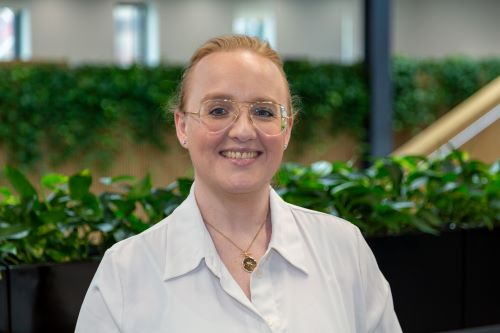
Tell us about your background. How has it led you to a career in robotics?
Since I was very young I have always had a strong interest in science and engineering, with a particular passion for space science and engineering.
My first degree was a BSc (Hons) in Physics from the University of Strathclyde in Glasgow followed by an MSc in High Power Radio Frequency Science and Engineering, and PhD in Space beam-wave interaction Physics. I had not necessarily thought about my career ‘path’ when I was much younger and just starting my undergraduate degree, however by the time I finished my degree, I knew I wanted to work in positions that were conducting space related research.
My step into the robotics sector came through my first role as a Research Associate in the Space Mechatronic (SMeSTech) Laboratory at the University of Strathclyde, working across engineering, physics and chemistry. After working in the Mechatronics laboratory as a space systems design engineer, I got a position in the Soft Systems Group at the University of Edinburgh where I worked briefly on the ORCA (Offshore Robotics for Certification of Assets) project and set-up a Robotics SuperLab with Prof. Adam Stokes, who is now one of the co-academic leads for the National Robotarium.
What do you enjoy about working in robotics?
I love working in the field of robotics as it is consistently interesting and demonstrating great innovation.
As a disruptive technology, it is always radically changing and contributing to advances in technology. There are also different forms of robotics such as modular (micro to industrial scale), wearable technology and soft robotic solutions. It is completely multidisciplinary with applications for a huge variety of sectors such as space, agriculture, healthcare and manufacturing, all of which add to the excitement for my curious mind.
I am always asking myself why does this happen and how does this happen. Science and engineering give me the ability to investigate and explain how things work, including the natural processes of the universe. My mother told me that from an early age my favourite question was “Why for?!” which I would ask my parents over and over for an explanation as to why things were doing what they do, and this is still the case today!
What is a typical day like for a Project Manager at the National Robotarium?
I love new experiences and being a Project Manager at the National Robotarium allows me to meet people and go to places and have discussions with a variety of sectors that I ordinally may not.
Day-to-day, the job is very busy. My tasks involve keeping track of the progress of various different robotics projects, devising mitigation plans to ensure deadlines and deliverable goals are met, meeting with industry stakeholders and working closely with our team of Robotics Engineers.
International Women’s Day was this month. What advice would you give to women and girls who are interested in a STEM career?
My advice would be to just get into it. If this is what you want to do and you have a passion for science and engineering, then get involved.
It is also good to surround yourself with like-minded, ambitious people and take advice from those who have gone before you and established themselves in similar fields. I am privileged to have been a finalist for the WES (Women in Engineering society) Top 50 Women in Engineering (Sustainability) 2020 as well as the winner of WES Top 50 Women in Engineering (Engineering Heroes) 2021 and it was wonderful to get recognition from my peers and mentors.
Remember, no two people’s paths are the same, so don’t compare yourself to others. My path to where I am now was a winding one but that didn’t stop me from getting there. So keep your head down, eyes up and remember: failure is not an option!
Why do you think the National Robotarium is globally significant?
The National Robotarium is always considering the future of robotics and its integration into our society. It is a world-leading centre that strives to have impact on society through the development and adoption of robotic solutions, with collaborations across academia and industry around the world.



